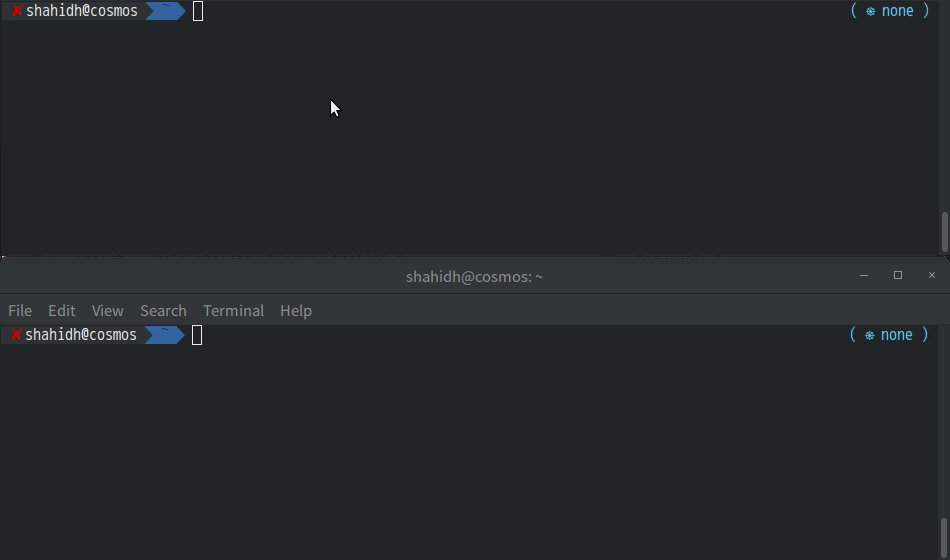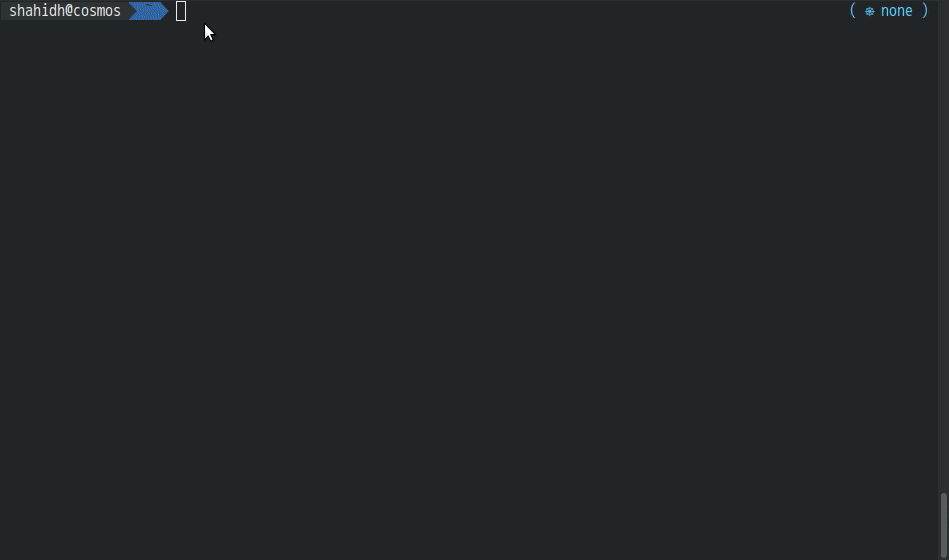graphqurl
curl for GraphQL with autocomplete, subscriptions and GraphiQL. Also a dead...
README
graphqurl
graphqurl is a curl like CLI for GraphQL. It's features include:
- CLI for making GraphQL queries. It also provisions queries with autocomplete.
- Run a custom GraphiQL, where you can specify request's headers, locally against any endpoint
- Use as a library with Node.js or from the browser
- Supports subscriptions
- Export GraphQL schema



Table of contents
- Usage
+ Query
+ GraphiQL
+ Args
+ Client
Installation
Steps to Install CLI
- ``` sh
- npm install -g graphqurl
- ```
Steps to Install Node Library
- ``` sh
- npm install --save graphqurl
- ```
Usage
CLI
Query
- ``` sh
- gq https://my-graphql-endpoint/graphql \
- -H 'Authorization: Bearer <token>' \
- -q 'query { table { column } }'
- ```
Auto-complete
Graphqurl can auto-complete queries using schema introspection. Execute the
command without providing a query string:
- ``` sh
- $ gq <endpoint> [-H <header:value>]
- Enter the query, use TAB to auto-complete, Ctrl+Q to execute, Ctrl+C to cancel
- gql>
- ```
You can use TAB to trigger auto-complete. Ctrl+C to cancel the input and
Ctrl+Q/Enter to execute the query.
GraphiQL
Open GraphiQL with a given endpoint:
- ``` sh
- gq <endpoint> -i
- ```
This is a custom GraphiQL where you can specify request's headers.
Subscription
Subscriptions can be executed and the response is streamed on to stdout.
- ``` sh
- gq <endpoint> \
- -q 'subscription { table { column } }'
- ```
Export schema
Export GraphQL schema to GraphQL or JSON format:
- ``` sh
- gq <endpoint> --introspect > schema.graphql
- # json
- gq <endpoint> --introspect --format json > schema.json
- ```
Command
- ``` sh
- $ gq ENDPOINT [-q QUERY]
- ```
Args
ENDPOINT: graphql endpoint (can be also set as GRAPHQURL_ENDPOINT env var)
Flag Reference
| Flag | Shorthand | Description |
|---|---|---|
| |---------------------|-----------|-------------------------------------------------------------------------------------------------------| | ||
| `--query` | `-q` | GraphQL |
| `--header` | `-H` | request |
| `--variable` | `-v` | Variables |
| `--variablesJSON` | `-n` | Variables |
| `--graphiql` | `-i` | Open |
| `--graphiqlHost` | `-a` | Host |
| `--graphiqlPort` | `-p` | Port |
| `--singleLine` | `-l` | Prints |
| `--introspect` | | | |
| `--format` | | | |
| `--help` | `-h` | Outputs |
| `--version` | | | |
| |`--queryFile` | | | |
| |`--operationName` | | | |
| |`--variablesFile` | | |
Node Library
Using callbacks:
- ``` js
- const { createClient } = require('graphqurl');
- const client = createClient({
- endpoint: 'https://my-graphql-endpoint/graphql',
- headers: {
- 'Authorization': 'Bearer <token>'
- }
- });
- function successCallback(response, queryType, parsedQuery) {
- if (queryType === 'subscription') {
- // handle subscription response
- } else {
- // handle query/mutation response
- }
- }
- function errorCallback(error, queryType, parsedQuery) {
- console.error(error);
- }
- client.query(
- {
- query: 'query ($id: Int) { table_by_id (id: $id) { column } }',
- variables: { id: 24 }
- },
- successCallback,
- errorCallback
- );
- ```
Using Promises:
For queries and mutations,
- ``` js
- const { createClient } = require('graphqurl');
- const client = createClient({
- endpoint: 'https://my-graphql-endpoint/graphql',
- headers: {
- 'Authorization': 'Bearer <token>'
- }
- });
- client.query(
- {
- query: 'query ($id: Int) { table_by_id (id: $id) { column } }',
- variables: { id: 24 }
- }
- ).then((response) => console.log(response))
- .catch((error) => console.error(error));
- ```
For subscriptions,
- ``` js
- const { createClient } = require('graphqurl');
- const client = createClient({
- endpoint: 'https://my-graphql-endpoint/graphql',
- headers: {
- 'Authorization': 'Bearer <token>'
- },
- websocket: {
- endpoint: 'wss://my-graphql-endpoint/graphql',
- onConnectionSuccess: () => console.log('Connected'),
- onConnectionError: () => console.log('Connection Error'),
- }
- });
- client.subscribe(
- {
- subscription: 'subscription { table { column } }',
- },
- (event) => {
- console.log('Event received: ', event);
- // handle event
- },
- (error) => {
- console.log('Error: ', error);
- // handle error
- }
- )
- ```
API
createClient
The createClient function is available as a named export. It takes init options and returns client.
- ```
- const { createClient } = require('graphqurl');
- ```
- options: [Object, required] graphqurl init options with the following properties:
- endpoint: [String, required] GraphQL endpoint
- headers: [Object] Request header, defaults to {}. These headers will be added along with all the GraphQL queries, mutations and subscriptions made through the client.
- websocket: [Object] Options for configuring subscriptions over websocket. Subscriptions are not supported if this field is empty.
- endpoint: [String, ] WebSocket endpoint to run GraphQL subscriptions.
- shouldRetry: [Boolean] Boolean value whether to retry closed websocket connection. Defaults to false.
- parameters: [Object] Payload to send the connection init message with
- onConnectionSuccess: [void => void] Callback function called when the GraphQL connection is successful. Please not that this is different from the websocket connection being open. Please check the followed protocol for more details.
- onConnectionError: [error => null] Callback function called if the GraphQL connection over websocket is unsuccessful
- onConnectionKeepAlive: [void => null]: Callback function called when the GraphQL server sends GRAPHQL_CONNECTION_KEEP_ALIVE messages to keep the connection alive.
- Returns: [client]
Client
- ``` js
- const client = createClient({
- endpoint: 'https://my-graphql-endpoint/graphql'
- });
- ```
The graphqurl client exposeses the following methods:
- client.query: [(queryoptions, successCallback, errorCallback) => Promise (response)]
- queryOptions: [Object required]
- query: [String required] The GraphQL query or mutation to be executed over HTTP
- variables: [Object] GraphQL query variables. Defaults to {}
- headers: [Object] Header overrides. If you wish to make a GraphQL query while adding to or overriding the headers provided during initalisations, you can pass the headers here.
- successCallback: [response => null] Success callback which is called after a successful response. It is called with the following parameters:
- response: The response of your query
- errorCallback: [error => null] Error callback which is called after the occurrence of an error. It is called with the following parameters:
- error: The occurred error
- Returns: [Promise (response) ] This function returns the response wrapped in a promise.
- response: response is a GraphQL compliant JSON object in case of queries and mutations.
- client.subscribe: [(subscriptionOptions, eventCallback, errorCallback) => Function (stop)]
- subscriptionOptions: [Object required]
- subscription: [String required] The GraphQL subscription to be started over WebSocket
- variables: [Object] GraphQL query variables. Defaults to {}
- onGraphQLData: [(response) => null] You can optionally pass this function as an event callback
- onGraphQLError: [(response) => null] You can optionally pass this function as an error callback
- onGraphQLComplete: [() => null] Callback function called when the GraphQL subscription is declared as complete by the server and no more events will be received
- eventCallback: [(response) => null] Event callback which is called after receiving an event from the given subscription. It is called with the following parameters:
- event: The received event from the subscription
- errorCallback: [error => null] Error callback which is called after the occurrence of an error. It is called with the following parameters:
- error: The occurred error
- Returns: [void => null] This is a function to stop the subscription
More Examples
Node Library
Queries and Mutations
Query example with variables
- ``` js
- const { createClient } = require('graphqurl');
- const client = createClient({
- endpoint: 'https://my-graphql-endpoint/graphql',
- headers: {
- 'x-access-key': 'mysecretxxx',
- },
- });
- client.query(
- {
- query: `
- query ($name: String) {
- table(where: { column: $name }) {
- id
- column
- }
- }
- `,
- variables: {
- name: 'Alice'
- }
- }
- ).then((response) => console.log(response))
- .catch((error) => console.error(error));
- ```
Subscriptions
Using promises,
- ``` js
- const { createClient } = require('graphqurl');
- const client = createClient({
- endpoint: 'https://my-graphql-endpoint/graphql',
- headers: {
- 'Authorization': 'Bearer Andkw23kj=Kjsdk2902ksdjfkd'
- }
- websocket: {
- endpoint: 'wss://my-graphql-endpoint/graphql',
- }
- })
- const eventCallback = (event) => {
- console.log('Event received:', event);
- // handle event
- };
- const errorCallback = (error) => {
- console.log('Error:', error)
- };
- client.subscribe(
- {
- query: 'subscription { table { column } }',
- },
- eventCallback,
- errorCallback
- )
- ```
CLI
Generic example:
- ``` sh
- gq \
- https://my-graphql-endpoint/graphql \
- -H 'Authorization: Bearer <token>' \
- -H 'X-Another-Header: another-header-value' \
- -v 'variable1=value1' \
- -v 'variable2=value2' \
- -q 'query { table { column } }'
- ```
 探客时代
探客时代





